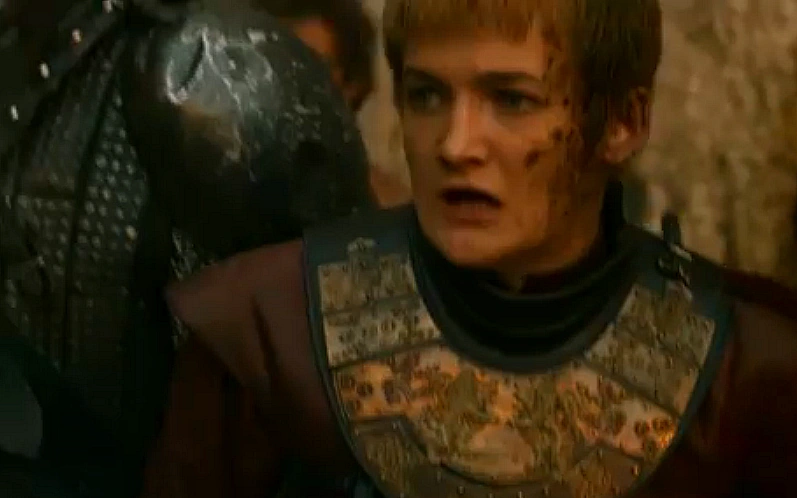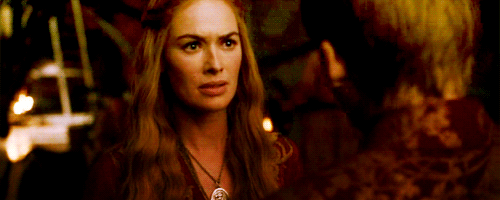SB
on Game of Thrones: Blog Entry Number
Six
Mythological
World
This week’s set of
episodes (2.7, 2.8, 2.9, and 2.10) not only demonstrated the importance of
storytelling within the Game of Thrones universe, but also
communicated that it is important for
viewers to understand the Game of Thrones
universe as a mythological world.
For example, consider the scene in episode 2.9 when Cersei attempted to
poison Tommen while telling a story about “a bear and her cub.” Even though this interaction was interrupted (with
the news of the outcome of the invasion) before Tommen could drink the poison,
this was a crucial scene in the second season of Game of Thrones that made a clear reference to folk legends.
I believe that this scene
communicated that storytelling is of high value in the Game of Thrones universe
(for purposes of escapism, deception, and more). Further, the fact that this crucial scene was
actually its own version of the “bear
and her cub” folk legend added an additional layer of presentation, and served
as a reminder to viewers that it is important to understand the Game of Thrones universe as a world of
mythology.
As
mentioned in my previous blogs and comments, rather than trying to place Game of Thrones within a specific
geographical or historical context, I have a better understanding of the Game of Thrones universe when I accept
its ambiguity and perceive it as an entirely fictional world. Like how Peter Berresford Ellis described the world
of Celtic mythology, I understand the setting of Game of Thrones as a universe on a plane of existence that transcends
time and space.
Yes, I believe there is
great value in identifying the actual historical/political events and
geographical places that inspired George R. R. Martin’s Game of Thrones universe because this can increase the public’s
interest in world history, political science, science, art, and other
fields. I am happy to learn that this
show has led many viewers to new interests in subjects like this. I am only claiming that the specific content of the show (like specific
characters, events, and places) is best understood as mythology (rather than
history) because many characters (and places) in the show tend to embody a wide
variety of ideas (from history, philosophy, mythology, and more), rather than
specific singular figures (and locations).
Even though Game of Thrones is quite progressive, this
show is keeping the traditions of mythology alive and can be understood as the
modern mythology of our time. Just like
how W. B. Yeats described the function of Irish fairy and folk tales, Game of Thrones utilizes fantasy
elements to communicate lessons about life and to encourage philosophical contemplation. Further, like T. A. Leederman’s description
of the commonalities between warging, greenseeing, and reading, Game of Thrones allows viewers to
transcend time and space not for the purposes of changing events, but for the
purposes of learning, understanding new perspectives, and building character.
Even though the article
“The Moral Luck of Tyrion Lannister” by Christopher Robichaud was read with
last week’s set of episodes (2.4, 2.5, and 2.6), this article contained analyses
of a few scenes that were in this week’s set of episodes. For example, recall the scene in the ninth
episode of the second season where the invading ships were set on fire. In sum, Robichaud held that these scenes were
demonstrations of the idea that the outcomes of human actions may rely on luck,
and claimed that if morality depends on luck, then people aren’t completely
responsible for their actions.
Like Kant, I’d like to
believe that some morally
praiseworthy and blameworthy actions might be within our control (Robichaud). For instance, in the tenth episode of the
second season, Tyrion had the opportunity to leave with Shae and live a
peaceful life. However, Tyrion chose to
stay, in order to deal with the problems.
It might have been in Tyrion’s self-interest to go and live a peaceful
life. I probably would have decided to
leave, if I were in Tyrion’s shoes. However,
Tyrion decided to stay and this was a morally praiseworthy action. Also, I am glad Tyrion did not leave because
Tyrion is still a favorite character and I want him to remain in the show for
as long as possible.
Works
Cited
Ellis, Peter
Berresford. Celtic Myths and Legends. Philadelphia, PA: Running Press Book Publishers, 2002. Print.
Leederman, T. A.
“A Thousand Westerosi Plateaus: Wargs,
Wolves, and Ways of Being.” Mastering
the Game of Thrones: Essays on George R.R. Martin’s A Song of Ice and Fire.
Eds. Jes Battis and Susan Johnston.
Jefferson, NC: McFarland, 2015. 189-203. Print.
Robichaud,
Christopher. “The Moral Luck of Tyrion Lannister.” Game of Thrones and Philosophy: Logic Cuts Deeper Than Swords. Eds. William Irwin and Henry Jacoby. Hoboken, NJ: Wiley & Sons, Inc., 2012.
183-193. Print.
Yeats, W. B. Irish Fairy and Folk Tales. New York,
NY: Barnes & Noble, Inc., 1993. Print.



